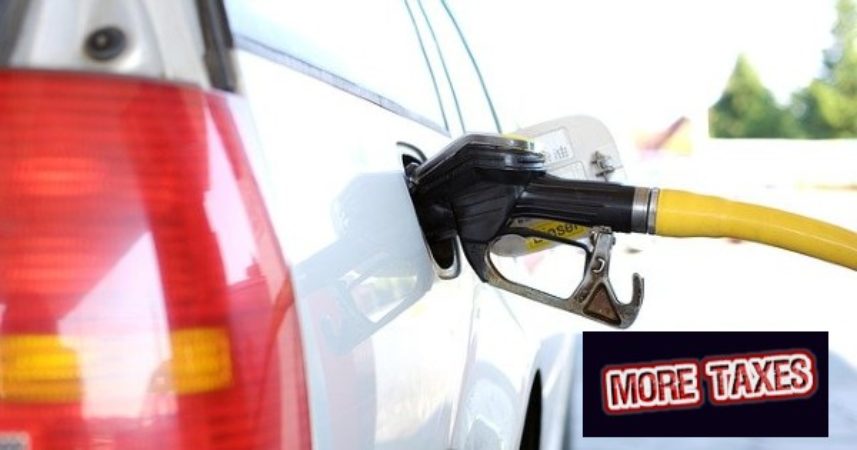Having imposed a carbon tax on Virginia electricity generation in 2020, the General Assembly starting in January 2021 will consider adding a similar tax on every gallon of gasoline and diesel sold for vehicle use. The Transportation and Climate Initiative, an environmentalist dream for a decade, is finally ready for its close up.
Advocates in the 12-state region that would make up the proposed interstate compact held two webinars in September, one focused on additional modeling on the project and the other discussing all the racially- and environmentally-just ways they believe states can spend the billions in new taxes.
The new modeling results did not change the basics of the program. TCI is a cap, tax and trade system that imposes a dollars-per-ton cost on the carbon dioxide emissions released by burning the fuels. The tax rate is set by an interstate auction, and the tax itself is imposed on the fuel wholesalers. The amount of fossil fuel emission credits that wholesalers may bid for will be capped and then will shrink a certain percentage every year.
The advocates have still not released a new memorandum of understanding, which Virginia would need to agree to. During the 2020 General Assembly, members of Governor Ralph Northam’s administration stated the issue would be brought before the full General Assembly and he would not simply sign the deal.
Once approved, the details of implementation would need to be worked out in a regulatory process imposing the supply cap and tax mechanism on all wholesalers serving the Virginia markets. Maryland will be the only adjoining state in the compact, creating additional pressure on the fuel industry along most of Virginia’s borders.
That still-hidden-in-the-weeds MOU will be crucial because it will set the reduction targets. The higher the targets, the higher will be the carbon tax and the steeper will be the slope on the reduced amounts of fuel for sale. The new models still project that a 20% reduction over a decade will start with a tax of 5 cents per gallon, while a 25% reduction will start with 17 cents per gallon and climb from there.
The final MOU is expected to include mechanisms to decrease the amount of emissions available slightly if auction prices drop too or increase them if they spike quickly. But there will still be a steady decrease in the number of gallons available for sale throughout the region, a form of rationing.
Governor Ralph Northam was just branded with a grade of “F” by the Cato Institute in part for raising gasoline taxes ten cents per gallon in some parts of Virginia and almost 18 cents per gallon in other parts of the state. That will put the state gas tax around 34 cents per gallon by July 2021.
With TCI carbon taxes added on, Virginia’s fuel taxes may be exceed 50 cents per gallon by next summer. Legislators seeking their own re-election, or seeking a statewide office, may need to explain why some parts of Virginia saw fuel taxes triple in two years.
The increases imposed this summer and fall have been all but invisible, with fuel prices down in the recession. A year from now could be different, the economy and fuel prices up, and another fuel tax hike then might be quite apparent to voters and business owners.
And to accomplish what? The new TCI modeling shows what the old version did: With no action whatsoever, market forces are already driving down emissions in the transportation sector. Old vehicles are being replaced by new, more efficient models, and electric vehicles are growing in popularity. By 2030 vehicle-related emissions could drop 19% or even more, without any caps or carbon tax.
Against that backdrop, the TCI goal is really to add only one to 6 additional percentage points of reduction in CO2 emissions. To claim substantial environmental or even health-related benefits from that is a stretch. The Thomas Jefferson Institute’s David Schnare, Ph.D., dismantled the earlier environmental and health benefit claims in a 2019 review, still valid apparently.
One of Schnare’s criticisms is the money being raised by the TCI carbon tax is not going to transportation infrastructure, while the declining cap on fuel sales will reduce the traditional sources of revenue for road construction and maintenance funds. The TCI organizers want to use the new tax revenues to subsidize electric cars and trucks, mass transit and non-vehicle travel (bike and pedestrian options.) Their models depend on assumptions that doing that will reduce fuel sales.
One of the TCI sales pitches will be promising to focus the financial aid on lower income communities. A major topic of that webinar’s discussion was the premise that urban and low-income citizens have been overburdened by traditional energy development and related pollution. At the webinar, Chris Bast of the Virginia Department of Environmental Quality touted the 2020 Virginia Environmental Justice Act and Northam’s creation of a cabinet-level Chief Diversity Officer.
Programs outlined in other states included subsidies for electric cars and buses, building out EV charging stations, residential development on transit lines and for home energy efficiency projects. The General Assembly debate could quickly devolve into a sticky contest between drivers who would pay the higher taxes or feel the pinch from a supply cap — heavily business, suburban and rural — and those who believe they will benefit from the new taxes, mostly urban.






